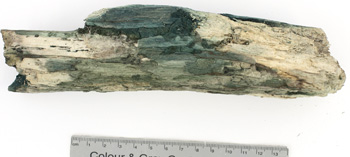Academic thesis
| Michael Pohl: | Chlorociboria stained inlay, its historical use and supplementary labor investigations | back |
| Language: | Original - Translation | |
| Overview: |
|
|
 Through Chlorociboria sp. stained beech wood, Image: Author
|
|
| Abstract: | This work deals with wood, which is stained green by the fungus Chlorociboria. All important historical documents, which engage in the green stained wood, the causing fungi and its stain, become listed chronological and summarized shortly from its first mention 1728 to this day. Thereby the current state of research will be described. Although examples of Objects become listed. A collection of wood found in the forests becomes analyzed and compared in its color. The influence of coatings is also research object like the influence about the pH-value and main pollutans in museums. Furthermore it will be done coloring experiments with the stain Xylindein. In the end the growing of Chlorociboria sp. and its stimulation of stain on different culture medium will be bespoken. |
| Keywords: | Chlorociboria, Chlorosplenium, Xylindein, Xylindein extraction, fresh wood staining |
 Bad Gandersheimer Walmdachkästchen, front view, earlyest detected Example, Image: Clemens Kappen
|
|
| Details: |
|
| Contact: |
Michael Pohl Goethestr. 37 02625 Bautzen Germany micha.pohl@[Diesen Teil loeschen]web.de |
The Hornemann Institute offers only the information displayed here. For further information or copies of academic work, please contact the author or - if there is no contact provided - the secretariats of the respective faculties.